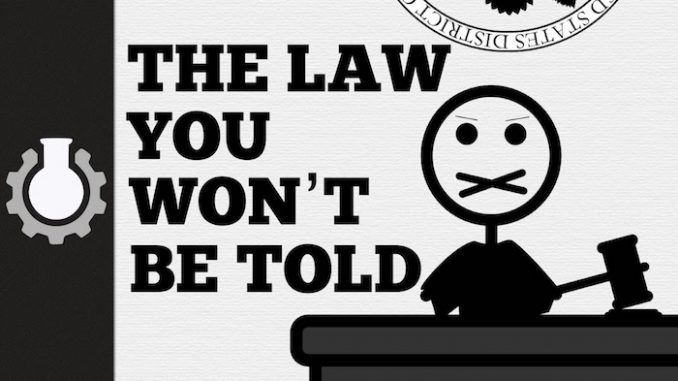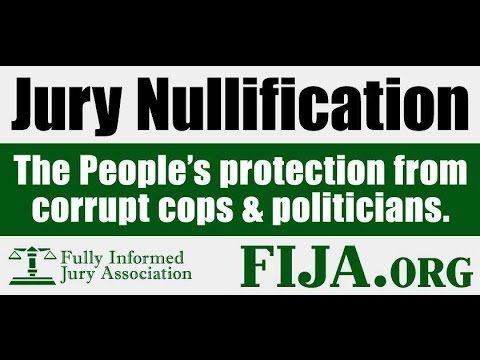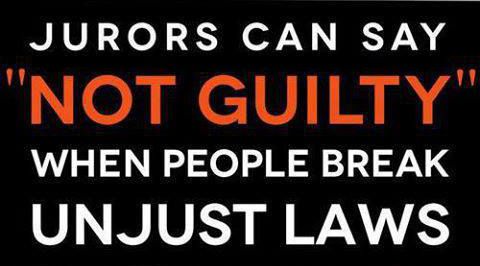
A large majority of U.S. citizens are completely unaware of a little thing called jury nullification. In essence, it gives members of a jury the power to throw an entire lawsuit out and acquit a criminal even if the state has done its job proving the defendant guilty.
A good example of this would be if an older man was arrested and on trial for growing medicinal marijuana in his own backyard for personal use. Let’s say the man is facing 20 years in prison and a steep fine. Now, this is where it gets interesting… Usually if the state (or whoever is prosecuting the older man) proved to the jury without a reasonable doubt that the man did, in fact, grow this marijuana in his yard – he is guilty of breaking the law.
But, most jurors are unaware that if they disagree with the law itself – they can use their power as a jury to nullify the entire case and the acquit the man, letting him go free. In reality, they can decide on a not guilty verdict for just about any reason.

BYPASS THE CENSORS
Sign up to get unfiltered news delivered straight to your inbox.
You can unsubscribe any time. By subscribing you agree to our Terms of Use
Jury Nullification – The Right You Have You Aren’t Supposed To Know Exists
Juror nullification is deliberately kept well-hidden because if more people knew about it huge numbers of lawsuits would be thrown out and our prison-industrial complex would most likely take a large hit (ah, the wonder of modern capitalism!). Also, there are some crazy rules preventing the judge and lawyers from even telling you that you have this power in some states, counties, and cities.

But all of that is changing in New Hampshire, which has passed a bill to help jurors become more informed about jury nullification. According to a new report from The Wall Street Journal:
The measure, which passed the chamber Wednesday and now heads to the Senate, would require courts to tell juries about their power to nullify in criminal cases. No state, at the moment, has such a requirement.
Nullification refers to the ability of jurors to acquit a defendant even if all the evidence points to guilt. Juries can exercise the power if rendering a guilty verdict would produce an unjust result.
WSJ’s Ashby Jones wrote about jury nullification in 2014 when the New Hampshire measure was first floated:
The U.S. Supreme Court has held that the Constitution largely bars the government from appealing a jury’s decision to acquit someone charged with crimes, regardless of the jury’s rationale. That rule, which forms the basis for nullification, essentially leaves juries free to render a “not guilty” verdict for just about any reason, including if they disagree with the underlying law.
Jurors typically don’t discuss why they acquitted a defendant, so tracking instances of nullification can be difficult. But the practice is used less frequently today than it was in the 19th and early 20th centuries, say legal experts, largely because judges have mostly stopped telling juries that the power exists.
The New Hampshire bill that cleared the House (HB 1270) expands upon a 2012 law. That earlier law sought to give defense lawyers the ability to inform jurors about nullification. As Gavel to Gavel notes, the state’s highest court ruled in 2014 that the law doesn’t require judges to tell jurors about the option in their instructions. Proponents of the new bill say it’s more meaningful when jurors hear about their nullification rights straight from the judge.

If HB 1270 becomes law, the court’s jury instruction would read as follows (the nullificaton part in italics):
The test you must use is this: If you have a reasonable doubt as to whether the state has proved any one or more of the elements of the crime charged, you must find the defendant not guilty. If you find that the law does not apply to the proven facts of the case, you must find the defendant not guilty. However, if you find, that the state has proved all of the elements of the offense charged beyond a reasonable doubt, but you find that based upon the facts of this case a guilty verdict will yield an unjust result, you may find the defendant not guilty.
Jury nullification is popular among libertarian activist who view it as a check against injustice. They point to the example of a New Hampshire jury that nullified the felony charges against a man arrested for growing marijuana in his backyard.
But the movement to expand its use and awareness hasn’t gained much traction beyond New Hampshire. Some says it’s a dangerous concept. “We’re a nation of laws, and collectively we decide that criminal acts have certain consequences. To function as a society, to have order, requires that we follow the law,” Scott Burns, a former executive director of the National District Attorneys Association, told WSJ in an earlier interview.


